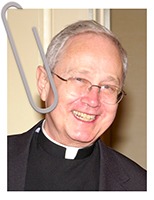[Apologies for my mistake in posting an early draft of my Easter Mindwalk. I discovered it only after the daily post was sent. I have since posted the corrected final version. It can be found at Easter – Missing the Point?]
There is so much polarization in our world today. And it is not just political. Polarization is on full display at all levels to the Church today… hierarchy, clergy, laity, vowed religious.
Polarization speaks of differing mindsets or starting points. We can look at mindsets as patterns of how people make sense of their world. For example, some people tend to be optimistic while others are pessimistic. Some like clear instructions while other don’t. We each have our default positions facing life.
Over the next several weeks the liturgy, drawing from the Acts of the Apostles, presents selected stories of ordinary people who coped with severe polarization some 2,000 years ago. Reading these stories is like flipping through random pages of a family history we might find in a trunk in an attic. Some stories will catch our interest, while others might not.
Superficial browsing or recognizing patterns
For a long time, I must admit I tended to be a browser in our family history. Then I realized these stories are about people just like us. They had to make sense of how their world had been turned upside down. They found themselves in situations they never expected… just as we never expected to face COVID.
Once I realized that I began to notice patterns in the stories recorded in Acts.
I began to see two mindsets in tension. One mindset focused on the challenges of keeping values as they were – with maybe some modifications. The other focused on the opportunities and challenges offered by Jesus who overturned their religious and/or cultural expectations. Both legitimate values.
Some were devout Jews whose whole life centered around their scriptures, a set style of worship, and detailed dietary laws. Within this there were the different mindsets of the Pharisees and the Sadducees. Others were Gentiles, predominantly Greek in language, customs, and religious background who knew nothing of Judaism and also had various approaches to a host of gods .
Neither group really understood the other. Yet there was something about Christ and his life, death, and resurrection that attracted people in each group.
The big picture … a clash of mindsets
The book of Acts shows us the transition of the Christian movement from a largely Jewish context to a gospel which is universal, not only embracing the Gentiles but becoming a somewhat Gentile phenomenon. It begins in Jerusalem with a handful of Jewish followers of Jesus. The Book of Acts ends in Rome and a predominantly Gentile Christian community.
The Book of Acts describes this transition:
- geographically, from Jerusalem to Rome;
- theologically, from Israel to Christian church;
- and culturally, from a Jewish form of Christianity to a Gentile form.
Each transition illustrates a classic case of a clash of mindsets! We must keep things as they were! We must adapt to a new way of looking at things! Ways of thinking were changing. Systems and structures were looked at anew.
It took them quite a while to sort out what was of value in their accustomed way of life and what the new way of life called for. There was so much they had not expected. (Who of us can not relate to that?)
The 28 chapters of stories give us much to think about.
I invite you to join me over the seven weeks of Eastertide exploring what we might learn about our own polarized mindsets today.
Questions – then and now
- How would you describe your mindset or default settings?
- Can different mindsets learn from each other?
- How can we become a listening people?
Click below for an audio version of the Vincentian Mindwalk


John, I might just take you up and join you over the next seven weeks exploring in Acts what we might learn about our own polarized mindsets today. I’m sure there’s much to discover about ourselves as we read stories “about people just like us,” nay, about ourselves. For we are they, even if not exact in the same way as Prophet Nathan telling David, “You are that man” (2 Sam 12, 7).
But whatever I discover, the challenge always is to keep in healthy tension the two “legitimate values” and to hold dear, and strive in earnest to do, the thing “about Christ and his life, death, and resurrection that attracted people in each group.”
Also, polarizations and rumors of polarizations is no reason to be too alarmed. Admittedly, they did use to alarm me, until October1995 when I rediscovered, with the help of Father Maloney’s “Ten Helpful Distinctions” (America, Oct. 14,1995), that “the poor have the true religion.” Says Father Maloney: “At times when there are tensions between some Church members and the hierarchy or scandals within the hierarchy itself, it is useful to note that the Church is thriving at its roots in the lives of the poor.”
Gal 2, 10, for its parts, reads, “Only, we were to be mindful of the poor, which is the very thing I was eager to do.”
And “let us go to the poor” became the rallying cry of the fledgling Society of St. Vincent the Paul. It was the members’ way of giving an explanation to those who challenged them, asking them for a reason for their faith and hope.
I hope that I’m not jumping the gun, John.
Not jumping the gun at all!
Father John, I will follow you